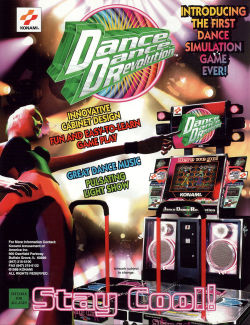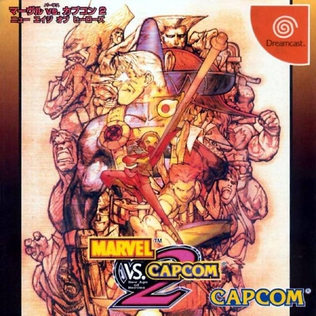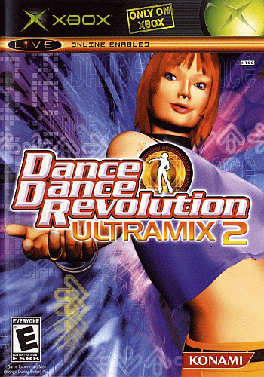See also
- Dance Revolution , a 2006 television series based on the video game series
Dance Dance Revolution is a music video game series by Konami. It may also refer to the following articles.
Dance Dance Revolution (DDR) is a music video game series produced by Konami. Introduced in Japan in 1998 as part of the Bemani series, and released in North America and Europe in 1999, Dance Dance Revolution is the pioneering series of the rhythm and dance genre in video games. Players stand on a "dance platform" or stage and hit colored arrows laid out in a cross with their feet to musical and visual cues. Players are judged by how well they time their dance to the patterns presented to them and are allowed to choose more music to play to if they receive a passing score.
Dancing Stage is a series of music video games developed and published by Konami. It is a spin-off of Dance Dance Revolution for the European market as well as a few Japanese titles. Games were released for arcade, PlayStation, PlayStation 2 and Wii.
Bemani, stylized as BEMANI, is Konami's music video game division. Originally named the Games & Music Division (G.M.D.), it changed its name in honor of its first and most successful game, Beatmania, and expanded into other music-based games, most notably rhythm games such as Dance Dance Revolution, GuitarFreaks, and DrumMania.
Karaoke Revolution and its sequels are music video games for the PlayStation 2, PlayStation 3, GameCube, Wii, Xbox, and Xbox 360, developed by Harmonix and Blitz Games and published by Konami in its Bemani line of music games. The original concept for the game was created by Scott Hawkins and Sneaky Rabbit Studios. Technology and concepts from the game were subsequently incorporated into Harmonix's game Rock Band.
Ridge Racer is a racing video game series developed and published for arcade systems and home game consoles by Bandai Namco Entertainment, formerly Namco. The first game, Ridge Racer (1993), was originally released in arcades for the Namco System 22 hardware, later ported to the PlayStation one year later as a launch title. It was met with several sequels and spin-off games for multiple platforms, the latest being the mobile game Ridge Racer Draw & Drift (2016) with the latest mainline game being Ridge Racer 7 (2006). Gameplay involves the player racing against computer-controlled opponents to be the first to finish in a race. Drifting is a core aspect of the series, and is used to keep speed while turning corners.

Paperboy is an arcade action game developed and published by Atari Games, and released in 1985. The player takes the role of a paperboy who delivers a fictional newspaper called The Daily Sun along a street on his bicycle. The arcade version of the game featured bike handlebars as the controller.

Dance Dance Revolution (DDR) is a music video game, developed by Konami, released in arcades on September 11, 1998, in Japan. Dance Dance Revolution is a unique game involving dance and rhythm that defined the genre. It involves timing and balance by having players use their feet instead of their hands like typical video games. In March 1999, the game was released for North American arcades, and for European arcades under the name Dancing Stage. Players and game critics were caught off-guard by the game's addictive qualities winning the new franchise many merits to its design.

Marvel vs. Capcom 2: New Age of Heroes is a crossover fighting game developed and published by Capcom. It is the fourth installment in the Marvel vs. Capcom series, which features characters from both Capcom's video game franchises and comic book series published by Marvel Comics. Originally released in Japanese arcades in 2000, the game received ports to the Dreamcast, PlayStation 2, PlayStation 3, Xbox, Xbox 360, and iOS devices over the span of twelve years.
Virtua Fighter is a series of fighting games created by Sega AM2 and designer Yu Suzuki. The original Virtua Fighter was released in December 1993 and has received four main sequels and several spin-offs. The highly influential first Virtua Fighter game is widely recognized as the first 3D fighting game released.

The Idolmaster is a Japanese raising simulation video game developed by Metro and published by Namco. It was released on July 26, 2005 as an arcade game and is the first game in The Idolmaster series. It was ported to the Xbox 360 on January 25, 2007 with many changes and improvements. The gameplay and story follows the career of a producer in charge of training prospective pop idols on their way to stardom. This includes arranging the idol's schedule, taking them to jobs, training them during lessons, and directing them through auditions. As gameplay continues, a relationship will develop between the idol and her producer fostered through talking with the idol and forming good memories.
Arika is a Japanese video game developer and publisher. It was formed in 1995 by former Capcom employees. It was originally known as ARMtech K.K, but was later named Arika. The name of the company is the reverse of the name of the company's founder, Akira Nishitani, who along with Akira Yasuda, created Street Fighter II. Arika's first game was Street Fighter EX. It was successful and was followed up with two updates, and its two sequels Street Fighter EX2 and Street Fighter EX3. In 2018, they released a spiritual successor to both Street Fighter EX and Fighting Layer, titled Fighting EX Layer. From 2019 to 2021, Arika collaborated with Nintendo to create the battle royale games Tetris 99, Super Mario Bros. 35, and with Bandai Namco for Pac-Man 99. Arika is also known for the Tetris: The Grand Master series, the Dr. Mario series, starting with Dr. Mario Online Rx, and the Endless Ocean series.

Street Fighter IV is a fighting game developed by Capcom and Dimps and published by Capcom. It was the first original main entry in the series since Street Fighter III in 1997, a hiatus of eleven years.

Dance Dance Revolution Ultramix 2, or simply Ultramix 2, is a music rhythm video game released on November 18, 2004 by Konami in American markets for the Microsoft Xbox.

Dance Dance Revolution, released in Europe as Dance Dance Revolution Hottest Party 4 for the Wii version and Dance Dance Revolution New Moves for other versions, is a music video game in the Dance Dance Revolution series, with this entry developed by Konami's American division. Unveiled at E3 2010, it was released for the Wii and PlayStation 3 in North America on November 16, 2010. A port of this version for the Xbox 360 was also released on April 12, 2011. It is also the only game in the series to be released for the PlayStation 3, as well as the final game in the series to be released for the Xbox 360.
Konami announced that Dance Dance Revolution will feature at least 30 licensed songs along with their original music videos and artwork, and at least 20 original tracks by Konami's in-house musicians. It was also announced that there would be at least 150 songs available as downloadable content for the PlayStation 3 and Xbox 360 versions at launch.

Michael Jackson: The Experience is a music video game based on Michael Jackson's songs. It was developed and published by Ubisoft, and was released on 23 November 2010 in North America, 25 November 2010 in Australia and 26 November 2010 in Europe for the Nintendo DS, PlayStation Portable, and Wii. It was also released on 12 April 2011 in North America, 14 April 2011 in Australia and 15 April 2011 in Europe for PlayStation 3's PlayStation Move and Xbox 360's Kinect. The Japanese release on 8 December 2011 only revised the PlayStation 3, Xbox 360, and Wii consoles. The game features many of Michael Jackson's hits, such as "Bad", "Thriller", "Beat It", "Billie Jean", "Smooth Criminal", "Black or White", "The Way You Make Me Feel", etc. However, some songs like "Man in the Mirror" and "P.Y.T. " are excluded. Initial launches of the game included a limited edition replica of Jackson's sequined glove. It was later released for the Nintendo 3DS on 7 November 2011 in North America and 11 November 2011 in Europe, for iPhone and iPad on 7 December 2011 in North America and for PlayStation Vita on 15 February 2012 in North America, 22 February 2012 in Europe and 23 February 2012 in Australia. It was announced that the game would be released on Mac OS X, and iPad 2. The game sold 2 million units in two months, not including Japanese sales, making it one of the best-selling Wii title games.

Dance Masters is a Japanese dancing video game developed by the makers of the Dance Dance Revolution series. The game was unveiled at Konami's E3 2010 press conference, for Xbox 360 Kinect. The game was released in November 2010. It includes 30 tracks, including 28 Konami original songs and two licensed Eurobeat songs. The spin-off Rhythm Party, titled Boom Boom Dance in Japan, was released on the Xbox 360 for the Xbox Live Marketplace on February 1, 2012.
The Idolmaster is a Japanese media franchise that began in 2005 with a raising simulation and rhythm video game series created by Bandai Namco Entertainment. The series primarily centers on the career of a producer who works with a group of prospective pop idols at the talent agency 765 Production. Originally released as an arcade game, the franchise has grown to numerous ports, sequels and spin-offs across multiple video game consoles, including several social network games. The series includes a variety of other media such as an anime with the same name, printed media, audio dramas, a Korean drama, and radio shows.